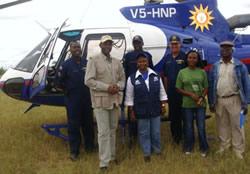Media Alert: Floods Affect Access to Healthcare for Thousands of People
Windhoek, 13 April 2011 -- “The worst flooding in decades has cut off thousands of people from health services”, said WHO Representative, Dr Magda Robalo, following a mission with Minister of Health and Social Services, Dr Richard Kamwi to assess the health sector response thus far and areas requiring additonal support. The high-level team over this last weekend visited several health facilities in the four most affected flood regions: Omusati, Oshana, Ohangwena and Oshikoto.
As final figures are being compiled from an earlier rapid assessment conducted by a Government-led team comprised of line Ministries, UN agencies, donors and partners, preliminary resultsfrom regional health authorities indicate that nearly 60,000 people are affected. As many as 40 health clinics are submerged with more than 100 health mobile outreach points made inaccessible due to damaged roads and bridges. In Omusati and Oshana regions alone, nearly 60% of mobile clinic points are not functional. In Omusati, 74 out of 128 mobile clinic points (58%) are inaccessible. In the Oshana region, 34 out of 43 mobile clinics (79%) are cut off. Consequently, many flood-affected people have limited to no access to health care.
Following the high-level mission, Honourable Minister of Health and Social Services Dr Richard Kami said, “Overall, the health facilities are well stocked, with essential medicines and supplies. Patients on chronic treatment for diabetes, hypertension, TB and HIV have been provided with adequate stocks of medicines for at least two-months. Water purification tablets and mosquito nets are also available due to pre-positioning and improved emergency health preparedness and response. Mobile teams are being sent out to provide basic healthcare to displaced communities. Despite this level of preparedness, we must remain vigilant as more rain is still expected.”
Adding further, WHO Representative Dr Magda Robalo says, “Our immediate concern is to ensure that families have access to basic health services, such as immunization, antenatal care for pregnant women, and that they deliver their babies in safe and hygienic conditions. Adequate nutrition should be ensured particularly to pregnant women, children, the elderly and those on chronic medication. Basic levels of hygiene should be maintained to prevent and contain the spread of diarrhoeal diseases. Daily disease surveillance and monitoring is critical to swiftly respond to any emerging outbreak of waterborne or vectorborne diseases.”
Dr Robalo warns that the full extent of the health impact is yet to be felt as essential services such as immunization are disrupted. Many children below five years are missing their routine schedule of vaccinations. While malaria outbreaks usually occur when water levels are stagnant, already nearly 300 cases of malaria have been reported in Omusati region alone. Diarrhoeal cases are reportedly low at present but this is expected to spike as flood waters subside and movement of people increases. We could also see people in isolated and hard to reach areas running out of their medication, having a longer-term effect on their health.”
“Given the high likelihood of continued heavy rainfall, we may see greater needs for emergency assistance as more people become displaced or otherwise affected. We remain vigilant and along with WHO we will continue to provide the necessary support to the affected regions,” notes the Honourable Minister Kamwi.
The WHO along with UN agencies will be launching a Central Emergency Response Fund and FLASH appeal to ensure continued support to the MoHSS.
Issued by: Ministry of Health and Social Services (MoHSS) & The World Health Organization (WHO):
WHO Communications & Advocacy: Michelle Thulkanam – email - thulkanamm [at] na.afro.who.int (thulkanamm[at]na[dot]afro[dot]who[dot]int) , Ph- 081-4230556



